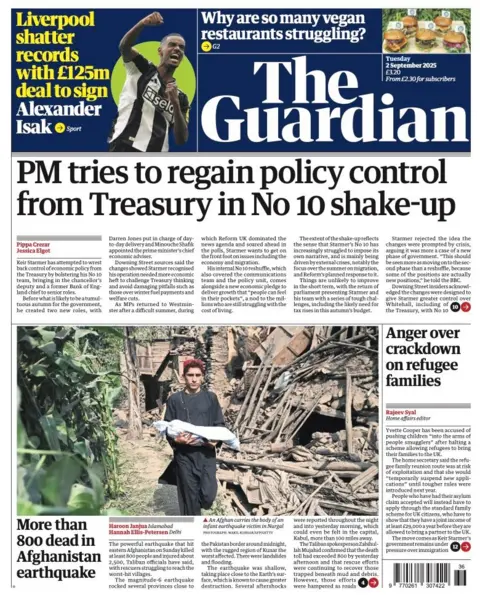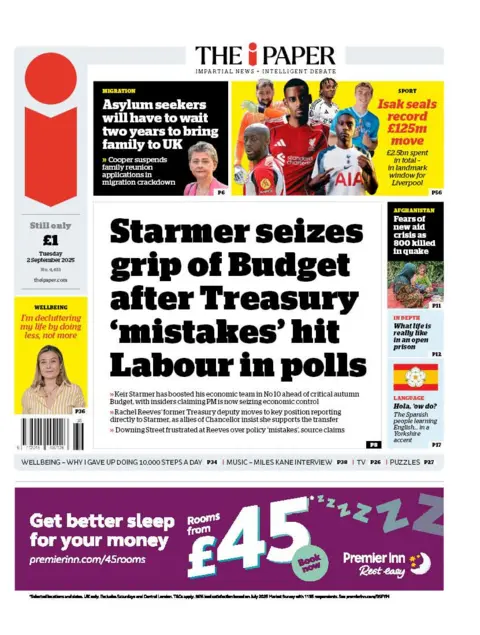Starmer reshapes No 10 team as papers say move shifts control of economic policy from Treasury
Prime minister creates two new roles ahead of autumn Budget as newspapers debate impact on Chancellor Rachel Reeves and lead with other major stories
Prime Minister Keir Starmer has reshuffled his No 10 team, creating two new posts intended to strengthen Downing Street's role in setting economic policy, moves that newspapers said on Tuesday amounted to an effort to seize control of the Budget from the Treasury.
The shake-up, announced as Parliament returned from recess, was widely interpreted in the media as a bid to sharpen the government's economic messaging ahead of a critical autumn Budget. Several outlets said the changes amounted to a reassertion of No 10 authority over economic strategy, and reported tensions inside Labour over the implications for Chancellor Rachel Reeves.

The Guardian said the prime minister was attempting to "wrest back control" of economic policy from the Treasury by creating two new roles in No 10. The i newspaper said "Starmer seizes grip of Budget", noting the timing of the appointments ahead of the autumn fiscal statement. The Daily Telegraph carried a front-page photograph of an upbeat Chancellor Reeves leaving the Treasury, saying the reshuffle "undermines" her authority and citing a Labour MP who called it "a signal that she is in a weak position and it's deteriorating."
The i also quoted a source saying Downing Street was "frustrated" with the Treasury over policy "mistakes", though other reports stressed that Mr Starmer and Ms Reeves remain politically close. Insiders and allies quoted in several papers said Reeves had been consulted about the changes and had discussed them on multiple occasions.
Labour sources declined to supply details of the new posts beyond describing them as senior roles focused on economic coordination and messaging. Officials said the appointments were aimed at ensuring a coherent approach to fiscal planning and the delivery of domestic economic priorities as the government prepares its next Budget.
Papers also led with other prominent stories as MPs returned to Westminster. Several outlets highlighted Labour's announcement of tougher asylum measures. The BBC's round-up of front pages noted the prominence of both the No 10 shake-up and the party's asylum policy on Tuesday morning. Newspapers' editorial framings and quoted sources varied in their assessments of whether the changes strengthened No 10 or reflected internal unease.
Beyond domestic politics, the Guardian ran strong coverage of a devastating earthquake in Afghanistan, carrying an image of a man walking past piles of rubble carrying the body of an infant. International correspondents reported that the tremor killed dozens and left many more injured and homeless, taxing already stretched relief capacities in the region.

Commentators and some MPs framed the No 10 appointments as a tactical move to control the narrative ahead of fiscal decisions, while others warned that overlapping responsibilities between Downing Street and the Treasury risked confusion. The papers conveyed a mix of reassurance from Labour figures that the changes were pragmatic and concern from critics that the moves could signal internal tension.
Labour officials said the timetable for announcing specific appointees to the new roles would follow and that the changes should be judged on outcomes for economic stability and growth. The Treasury declined to comment beyond reiterating that it continued to work closely with No 10 on Budget preparation.
As the government moves into a period of heightened fiscal scrutiny, media attention is likely to remain focused on the balance of power between the prime minister's office and the Treasury, the content of the autumn Budget and the political effects of policy shifts on high-profile figures such as the chancellor. International events, including the humanitarian impact of the Afghanistan earthquake, continued to feature on front pages and in Westminster discussions as MPs resumed work.